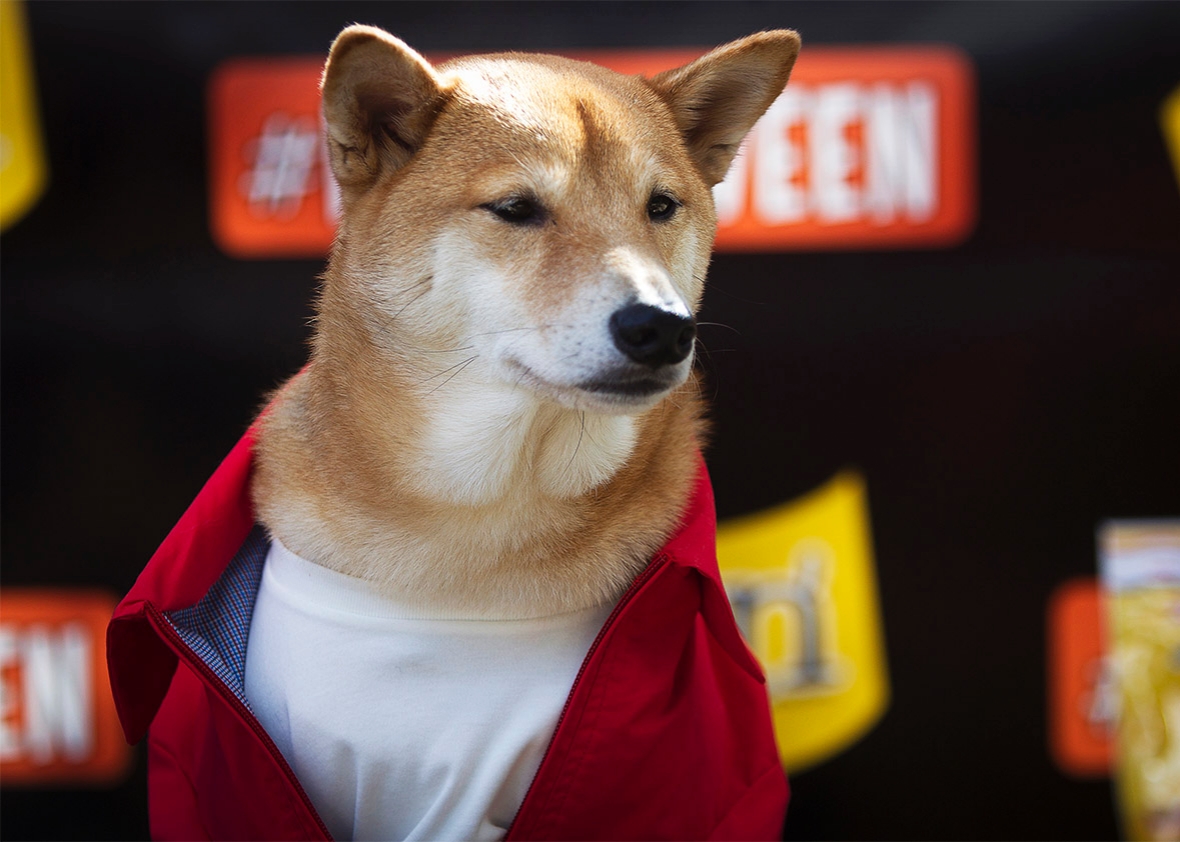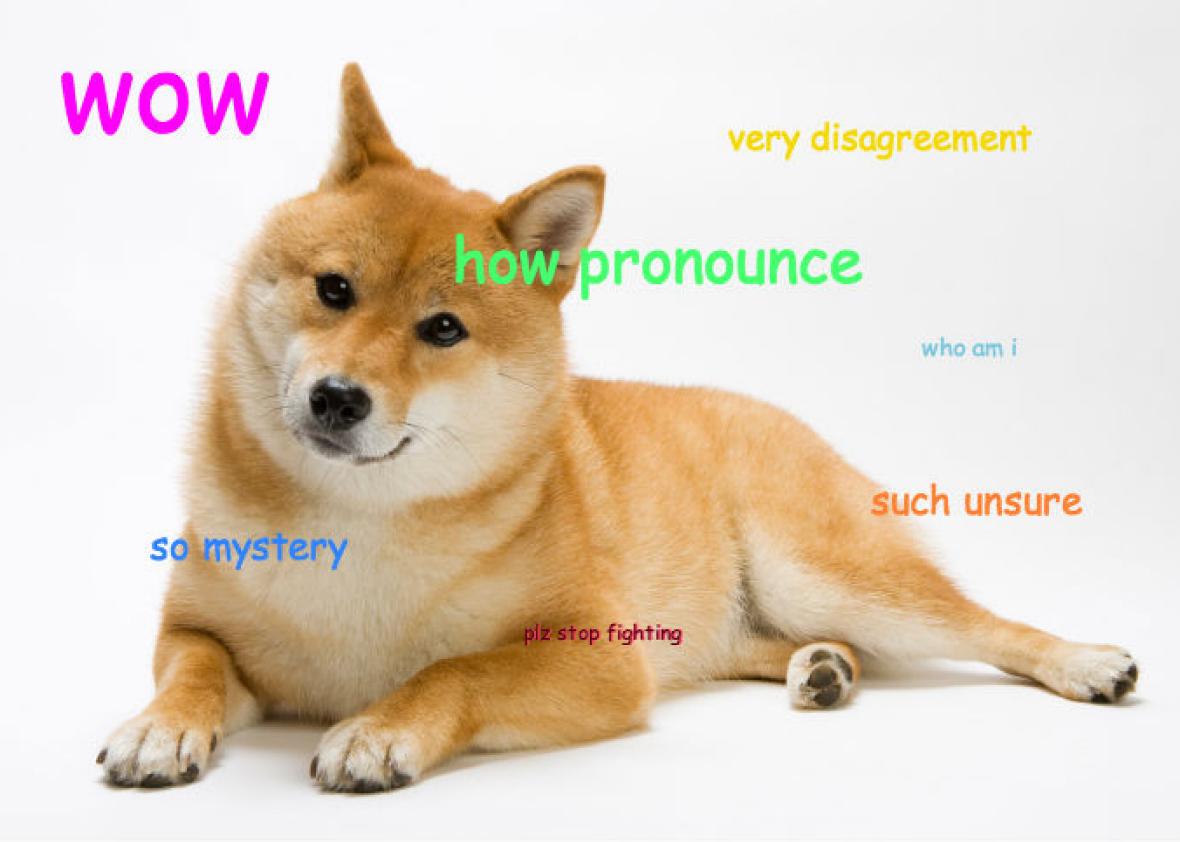The Shiba Inu, the Dog Behind the Doge
What happens to a breed when it goes viral online.

Carlo Allegri/Reuters
In 2008, a couple of San Francisco shiba inu breeders welcomed a new litter of six puppies into their home, trained a webcam on their pen, and live-streamed video of the little ones online so they could monitor their movements. They weren’t the only ones watching. The pups—Autumn, Ayumi, Amaya, Aki, Akoni, and Ando—and their anonymous human handlers, known by fans as “Mr. Feet” and “Mrs. Shoes,” soon amassed millions of viewers around the world. Within six weeks, fans had streamed the dogpile so obsessively that they’d watched it for a combined 391 years. The dogs made the Today Show, helped launch streaming startup Ustream.tv, and introduced the breed—which had long been big in Japan—to an international audience.
It was just the beginning of the love affair between the Internet and the shiba inu. In 2013, a photograph of a particularly finely formed shiba, caught on camera shooting a gloriously awkward side-eyed glance, exploded into the doge meme. Kabosu, the Japanese dog behind the meme, has since been embraced on Vine, where his six-second videos have been watched 88 million times.
Then there’s Instagram’s most famous dog, the Japan-based shiba inu Maru Taro, who’s amassed 2.3 million followers with the help of his chill as hell squinty-eyed grin. (He kind of looks like the pet in the stoner comedy who gets blazed off the fumes.)
There’s also the dapper New York shiba Bodhi, whose humans dress him in bow ties, blazers, and scarves and advertise him as “Menswear Dog”; he now nets $15,000 a month in endorsements from companies like Coach, Brooks Brothers, and Purina. And Mr. Feet and Mrs. Shoes are still streaming their breeding activities: They recently debuted a new litter of pups—nieces and nephews of the original puppy-cam stars.
Now, shibas are making the leap from Internet darlings to mainstream pop products. In 2014, the shiba inu won Animal Planet’s “World Pup” championship, beating out delegates from China (a shar-pei) and Spain (a Great Pyrenees). Shibas have since been spotted posing for a billboard advertising an Ohio hospital, filling out a nuclear family in a Ford Explorer commercial, and even sitting front row at the Chanel runway, where supermodel Cara Delevingne recently debuted her new pup—a mutt who exhibits the classic shiba side-eye and foxlike tail. At a high-end West Village puppy boutique I visited recently, three of the two dozen or so puppies in the window were shibas. An employee bounced one roly-poly puppy in his arms and recited the basics to cooing customers: “Shiba inu, Japanese dog. Shiba inu, Japanese dog.”
Shiba enthusiasts coalesced online years before the breed went viral. In 2008, a group of online “shibaholics” managed to wrest their attention away from the puppy cam to help raise more than $8,000 for shiba rescue efforts. A New York–based Meetup group for “Shiba Inus and their Human Companions” launched in 2006. When a Brooklyn shiba named Nami went missing in 2012, Web-based enthusiasts came together to track her down; once she was found, the search crew launched Shiba Prom, a nonprofit that organizes digital fundraising parties with themes like “Livin’ La Shiba Loca.” And doge evolved out of “Shiba Confessions,” a meme that first delighted dedicated shiba enthusiasts—a group that swapped pet pics tagged with Comic Sans non sequiturs—before it caught on among the shiba uninitiated.

Photo illustration by Forrest Wickman. Photo by Thinkstock.
Has online shiba obsession translated to offline ownership? Two years ago, Jezebel’s Erin Gloria Ryan reached out to the National Shiba Club of America and asked whether the popularity of doge had led to a surge in shiba interest. A rep claimed that, in fact, interest in shibas was decreasing, and she hoped to keep it that way. The shiba, which is the domesticated dog genetically closest to a wolf, is “not the breed for most people,” she said. “If you want to spend thousands of dollars repairing the damage your puppy has done, then yeah, go ahead! Be crazy! There are lots of crazy people on the planet.”
When I emailed the group for more up-to-date intel, I received mixed messages. “The breed is definitely getting more popular,” one rep told me. “At the level of the national club, we have still not heard of any uptick in breeding or adoption of shibas,” said another.
But Nathalie Abutaha, founder and president of DC Shiba Inu Rescue, has registered the online boom in her own work. “People don’t even call them shibas anymore. They come up and say, ‘You have a doge!’ ”
Actually, she has four: Sachi, Katniss, Wolfie, and Bear. Since Abutaha adopted her first shiba nine years ago, she’s watched the D.C. community balloon from a handful of owners to “hundreds and hundreds” of fans. The Internet craze has translated to “a lot more interest in shibas” IRL, which means more qualified adopters, more dedicated volunteers, and great visibility for the rescue. But it also means that there are a lot more shibas that need to be saved. “Because they’re so adorable, we’re seeing a lot more impulse buys, more backyard breeders, and more people who have done no research on the breed before they adopt,” Abutaha told me.
The shiba inu is a primitive breed, and that means it has a stronger prey drive, can run loose when unleashed, and is not always inclined to do what a human wants. Abutaha started the rescue after learning that shibas that turned up at local shelters were being slated for euthanasia after flunking the American Society for the Prevention of Cruelty to Animals’ SAFER Aggression Assessment, a temperament test that she says doesn’t always recognize the unique challenges faced by untrained shibas forced to live in carts or crates. Now, she’s meeting owners who surrender their shibas and say, “Oh, it’s really cute, but I didn’t know it would be so hard to handle.”
DC Shiba Inu Rescue creates and shares its own shiba memes to help its rescue and adoption efforts. In contrast to the personalities projected by the most popular Internet shibas—the contemplative doge, the compliant Menswear Dog, the cherubic Maru—DCSIR’s memes reveal the temperament of the more typical shiba. One of them is Grumpy Bear—the “King of Crabby,” the “Sultan of Sulk,” the “Duke of Disinterest”—who scowls for the camera alongside Garfield-esque bons mots like “Decaf only works if you throw it on people” and “I love sleep, it’s like a time machine to breakfast.” The rescue’s Facebook page also celebrates “De-Motivational Wednesday,” with image macros that highlight the shiba’s aloofness (“Personal space: It’s not just for humans anymore”) and stubbornness (“Was this your spot? It’s mine now”). If you’ve only seen shibas on Instagram, these memes aren’t funny at all. If you get the joke, you might actually be prepared to own one.
